#from on dictator to another
Explore tagged Tumblr posts
Text
El gobernante cubano Miguel Díaz-Canel Bermúdez volvió a mostrar su apoyo al presidente de Venezuela Nicolás Maduro, a pesar de las reclamaciones de la oposición de ese país y de la comunidad internacional para que muestre las actas electorales de la contienda donde se declaró vencedor.
"Nos solidarizamos, sin una sola duda, con el hermano pueblo venezolano y con nuestro compañero, Nicolás Maduro", dijo el designado mandatario cubano durante una intervención virtual en la Cumbre del ALBA-TCP que se desarrolla este lunes.
En su alocución, grabada en el Palacio de la Revolución, Díaz-Canel mencionó que “confía en que con esa fuerza, la patria de Bolívar, Chávez y Maduro, seguirá demostrando que está a prueba de todas las amenazas y acosos”.
El régimen cubano fue de los primeros en reconocer la proclama de Maduro como presidente de Venezuela en las pasadas elecciones del 28 de julio, una contienda que ha sido acusada de irregularidades y que el gobierno chavista no ha sido capaz de revertir las opiniones.
Alineados a un discurso de apoyo a su aliado continental, Díaz-Canel volvió a culpar a “las oligarquías regionales, el imperialismo, los emporios de las comunicaciones y las plataformas digitales” de lo que sucede en Venezuela, siguiendo la ruta de Maduro que ha buscado intenciones “golpistas” en todos estos actores, pero sin probar que “ganó” las elecciones inobjetablemente.
"Con absoluta irresponsabilidad, se estimula concertadamente el regreso a los planes de desestabilización en Venezuela. No podemos permitirlo", señaló el gobernante que volvió a lucir su brazo en cabestrillo.
En un acto de cinismo mayúsculo, Díaz-Canel aseguró que “reconoce y admira la respuesta serena, el alto sentido democrático institucional y la vocación de paz mostradas por el presidente Nicolás Maduro y su equipo”. Unas palabras que desconocen la lucha mostrada por los sectores populares insatisfechos con el resultado electoral, y los cuales han sido acosados, reprimidos y encarcelados por el régimen gobernante en Venezuela.
Sin el mínimo sentido de responsabilidad expresó que “la voluntad de la mayoría debe ser respetada. El pueblo venezolano votó con total conciencia a favor de la dignidad, de su soberanía y por la paz”.
Esta muestra de apoyo no es la primera que expresa el designado por Raúl Castro al frente del gobierno en la isla. Dos días después del fraude perpetrado por su “amigo” Maduro, llamó a los opositores en Venezuela como "guarimberos de turno" y enemigos de Nuestra América.
Su mensaje, publicado en la red social X, recibió miles de interacciones y numerosas respuestas, algunas personas le acusaron de ser un "dictador que apoya a otro dictador".
En otra oportunidad, los cubanos han criticado esas muestras de respaldo a un proceso electoral cuestionado.
Una persona escribió que mientras Díaz-Canel le da una palmada de felicitación al venezolano, en Cuba “están comiendo de los basureros; tienen apagones de 20 horas; no hay combustible y la isla entera es una cárcel”.
0 notes
Text

Hello Madam. Sorry Madam.
[First] Prev <–-> Next
#poorly drawn mdzs#mdzs#wei wuxian#lan wangji#madam jin#jin zixuan#jiang yanli#'Hey what is WWX trying to do here?' some kind of grab-and-twist maneuver that would be very upsetting to watch.#I know LWJ technically assists WWX in this scene in terms of blocking someone's blow on his behalf -#- but let's be honest. Real friends stop you from doing the truly stupid things.#Or maybe it was envy. Penis envy. The non-freudian kind.#Regardless...man this whole scene was just full of “and then someone else walks in”.#I swear to god every cultivator who is supposed to be hunting ends up wandering into this part of the woods.#a bonus for me because it gives me several good joke opportunities.#Madam Jin gets top prize for best entrance and exit. I wish her all the best. And a divorce…madam please leave him…#And can we please address the horses? I love horses. But why...why do they ride in on horses when they HAVE FLYING SWORDS?#I can only imagine it is for the dramatic flair? It just feels so jarring hearing someone clip clop in#and then another person swoop in on a sword.#The rules of mdzs's world can get fuzzy and I have to nod in an impressed manner at how much MXTX gets away not explaining.#Maybe the sword gets tired after a while and they need to give it a break? Maybe there is a sword union that dictates working hour limits?#…Would that make Chenqing a scab? Oh god it would… unions *hate* this flute!
1K notes
·
View notes
Text
The Committee of Public Safety being a totally healthy work environment with no issues whatsoever compilation
First, some statistics:
Leaving in the middle of a session due to fighting: Collot (1 time), Robespierre (3 times), Saint-Just (4 times), Lindet (1 time)
Starting to cry during a session: Carnot (1 time), Robespierre (1 time)
Threatening your co-workers: Robespierre (2 times), Saint-Just (2 times, one of them a death threat), Couthon (1 time)
Calling your co-workers traitors/scroundrels/ counter-revolutionaries/aristocrats/conspirators/foreign agents: Billaud (1 time), Saint-Just (3 times), Robespierre (5 times), Collot (2 times), Barère (1 time)
Accusing your co-workers of aspiring towards dictatorship: Carnot, Billaud, Barère, Collot, Lindet (1 time)
Accusing your co-workers of wishing to destroy patriots: Robespierre, Collot (1 time)
Using physical violence against your co-workers: Collot (2 times?)
Defending your co-worker against another co-worker in a way that doesn’t at all make it seem like you’re into him: Saint-Just (3 times) Barère (1 time)
Saint-Just had such indifference that, about this time (return from Fleurus), he came one evening to propose to the committee a strange means of promptly ending the struggle of the revolution against the suspected and imprisoned nobles. These were his words: ”For a thousand years the nobility have been oppressing the French nation with exactions and feudal vexations of every kind, feudalism and nobihty exist no longer, if you want to repair all the frontier roads for the passage of the artillery, convoys, and transports of our army, order the imprisoned nobles to go to work daily and mend the highways.” […] When Saint-Just had finished there was a movement of silent indignation amongst us all, succeeded by a unanimous demand for the order of the day. I thought I ought to stipulate for the national character by saying to Samt-Just and the committee that we should be opposed to such a kind of punishment for prisoners even if the law pronounced it, that the nobility could be abolished by wise laws, but that the nobles always preserved in the mass of the people a rank, a distinction due to education, which prevented us from acting at Paris as Manus did at Rome. ”Ah,” exclaimed Samt-Just, “Marius was more politic and a greater statesman than you will ever be. I wished to try the strength, the temperament, and the opinion of the Committee of Pubhc Safety. You are not fit to combat nobility, since you cannot destroy it, it will devour the Revolution and the revolutionists. I retire from the committee.” He quickly withdrew, and set out for the army, until the moment when he thought himself capable of executing vaster projects with Robespierre, Couthon, and Lebas, his associates. Memoirs of Bertrand Barère, volume 2, page 139-140.
It is the inherent vice of bad laws, and, above all, of penal laws devoid of motive, which attack a great number of innocent people, to nullify themselves. Saint-Just did not understand that. He attacked me, and accused me of having put under requisition the relatives of several emigrants whilst the law punished them in their property. The committee appeared struck by this accusation, and asked him to explain himself and name some of the relations. He named several, but they were all unknown to us. He afterwards named Mademoiselle d’Avisard, of Toulouse, whose father was abroad. Here I replied that the fate of this innocent girl, who was but sixteen years of age, and obliged by the terrible laws against emigrants to subsist at Paris by manual labour, for she was then engaged in making gaiters for our soldiers, was in the highest degree worthy of compassion and interest. […] The Committee of Public Safety thought this explanation sufficient. It saw that it was only a wicked recrimination by Saint-Just, supported by the presence of Robespierre. Memoirs Of Bertrand Barère, volume 2, page 147-148.
Robespierre murmured a lot about the forms that we had established in Lyon for the execution of decrees: he constantly repeated that there was no reason to judge the guilty when they are outlawed. He exclaimed that we had let the families of the condemned go free; and when the commission sent the Convention and the committee the list of its judgments, he was not in control of his anger as he cast his eyes on the column where the names of the citizens who had been acquitted were written. Unable to change anything in the forms of judgment, regulated according to the decrees and approved by the committee, he imagined another system; he questioned whether the patriots of Commune-Affranchie were not vexed and under oppression. They were, he said, because the property of the condemned being specially intended, by article IV of the decree of July 12, to become their patrimony, we had greatly reduced their claims, not only by not judging only a quarter of the number of conspirators identified by Dubois-Crancé on 23 Vendémiare, or designated by previous decrees, but also by establishing a commission which appeared willing to acquit two thirds, as it happened. Through these declamations Robespierre wanted to entertain the patriots of whom he spoke, with the most violent ideas, to throw into their minds a framework of extraordinary measures, and to put them in opposition with the representatives of the people and their closest cooperators: he made them understand that they could count on him, he emboldened them to form all kinds of obstacles, to only follow his indications which he presented as being the intentions of the Committee of Public Safety. Défense de J-M. Collot, répresentant du peuple. Éclaircissemens nécessaires sur ce qui s’est passé à Lyon (alors Commune-Affranchie), l’année dernière; pour faire suite aux rapports des Répresentants du peuple, envoyés vers cette commune, avant, pendant et après le siège (1794)
Billaud Varennes: […] The first time I denounced Danton to the committee, Robespierre rose like a madman and declared that he saw my intentions, that I wanted to lose the best patriots. Billaud-Varennes accuses Robespierre during the session of 9 Thermidor
Why should I not say that [the dantonist purge] was a meditated assassination, prepared for a long time, when two days after this session where the crime was taking place (March 30 1794), the representative Vadier told me that Saint-Just, through his stubbornness, had almost caused the downfall of the members of the two committees, because he had wanted the accused be present when he read the report at the National Convention; and such was his obstinacy that, seeing our formal opposition, he threw his hat into the fire in rage, and left us there. Robespierre was also of this opinion; he believed that by having these deputies arrested beforehand, this approach would sooner or later be reprehensible; but, as fear was an irresistible argument with him, I used this weapon to fight him: You can take the chance of being guillotined, if that is what you want; For my part, I want to avoid this danger by having them arrested immediately, because we must not have any illusions about the course we must take; everything is reduced to these bits: If we do not have them guillotined, we will be that ourselves. À Maximilien Robespierre aux enfers (1794) by Taschereau de Fargues and Paul-Auguste-Jacques.
In the beginning of floréal (somewhere between April 20 and 30) during an evening session (at the Committee of Public Safety), a brusque fight erupted between Saint-Just and Carnot, on the subject of the administration of portable weapons, of which it wasn’t Carnot, but Prieur de la Côte-d’Or, who was in charge. Saint-Just put big interest in the brother-in-law of Sijas, Luxembourg workshop accounting officer, that one thought had been oppressed and threatened with arbitrary arrest, because he had experienced some difficulties for the purpose of his service with the weapon administration. In this quarrel caused unexpectedly by Saint-Just, one saw clearly his goal, which was to attack the members of the committee who occupied themselves with arms, and to lose their cooperators. He also tried to include our colleague Prieur in the inculpation, by accusing him of wanting to lose and imprison this agent. But Prieur denied these malicious claims so well, that Saint-Just didn’t dare to insist on it more. Instead, he turned again towards Carnot, whom he attacked with cruelty; several members of the Committee of General Security assisted. Niou was present for this scandalous scene: dismayed, he retired and feared to accept a pouder mission, a mission that could become, he said, a subject of accusation, since the patriots were busy destroying themselves in this way. We undoubtedly complained about this indecent attack, but was it necessary, at a time when there was not a grain of powder manufactured in Paris, to proclaim a division within the Committee of Public Safety, rather than to make known this fatal secret? In the midst of the most vague indictments and the most atrocious expressions uttered by Saint-Just, Carnot was obliged to repel them by treating him and his friends as aspiring to dictatorship and successively attacking all patriots to remain alone and gain supreme power with his supporters. It was then that Saint-Just showed an excessive fury; he cried out that the Republic was lost if the men in charge of defending it were treated like dictators; that yesterday he saw the project to attack him but that he defended himself.
”It’s you,” he added, ”who is allied with the enemies of the patriots. And understand that I only need a few lines to write for an act of accusation and have you guillotined in two days.” ”I invite you, said Carnot with the firmness that only appartient to virtue: I provoke all your severity against me, I do not fear you, you are ridiculous dictators.” The other members of the Committee insisted in vain several times to extinguish this ferment of disorder in the committee, to remind Saint-Just of the fairer ideas of his colleague and of more decency in the committee; they wanted to call people back to public affairs, but everything was useless: Saint-Just went out as if enraged, flying into a rage and threatening his colleagues. Saint-Just probably had nothing more urgent than to go and warn Robespierre the next day of the scene that had just happened, because we saw them return together the next day to the committee, around one o'clock: barely had they entered when Saint-Just, taking Robespierre by the hand, addressed Carnot saying:
”Well, here you have my friends, here are the ones you attacked yesterday!”
Robespierre tried to speak of the respective wrongs with a very hypocritical tone: Saint-Just wanted to speak again and excite his colleagues to take his side. The coldness which reigned in this session, disheartened them, and they left the committee very early and in a good mood. It was at this time that the division became pronounced in a very noticeable manner, and soon after we saw it claimed in the English papers that the Committee of Public Safety was divided. For some time now we had been distrusting each other, we were observing each other, we were no longer deliberating with them with this abandonment of trust. Until then Robespierre had done little; he constantly brought us his concerns, his suspicions, his shady expressions and his political bile; he only concerned himself with personal measures; he only drafted arrest warrants, he only dealt with factions, newspapers, the revolutionary tribunal. Nothing about the Government, nothing about the war, never having either views to propose or a report to make, he spent his time destroying our courage, despairing of the salvation of the country and speaking of its slanderers and its assassins; his favorite expressions were, everything is lost, there are no more resources. I no longer see anyone to save it, he always cried. When news of victory were brought by a courier, he spoke of upcoming betrayals, he tarnished our joy or attacked the representatives of the people near the victorious army. The more triumphant the Northern army was, the more strongly he denounced Richard and Choudieu; when the troops besieged Ypres, a stronghold and the key to West Flanders, a capture which, according to the decrees of the committee, was to open and ensure the campaign; Robespierre shouted against the representatives of the People near this army and had complaints written that the troops had not taken Ostend sooner. He seemed to us to be pursued by victories as well as by furies, and he often reproached the committee's rapporteur for the length and exaltation of his reports on the triumphs of the armies. Réponse des membres des deux anciens Comités de salut public et de sûreté générale (Barère, Collot, Billaud, Vadier), aux imputations renouvellées contre eux, par Laurent Lecointre et declarées calomnieuses par décret du 13 fructidor dernier; à la Convention Nationale (1795), page 103-105.
Robespierre, supported by the Jacobins, was the most influential member of the Committees without being the most wicked. His supporters were, however, in the minority; the plan to adjourn the sessions of the Convention had not obtained theor approval. One thought it necessary to oppose Robespierre with the masculine structure of Collot d’Herbois. A quarrel caused by the proposal of a proscription list to which Robespierre was precisely opposed (it involved the arrest of 14 deputies and citizens); this list, put up for discussion by the majority, passed to each member who added names to it, when it reached Robespierre, it had 32 deputies on it. Robespierre said: “I see five or six deputies unworthy of the character with which they are invested: it will be easy to induce them to resign: but I will lend neither my vote nor my signature to the revenge that you want to exercise.” Two friends of Robespierre were of his opinion: heads became heated, quarrels ensued: Robespierre was reminded of the fact he had voted against the Danton faction. The three opponents were treated as moderates. Robespierre, getting up angrily, said to them: “You are killing the Republic, you are the faithful agents of the foreigner who fears the system of moderation that we should adopt.” The session became so stormy that Collot used acts of violence against Robespierre. He threw himself at him and seized him by the flanks. He was about to throw Robespierre through the window when the latter's friends rescued him. Robespierre then declared that he was leaving the committee, that he could not honorably sit with executioners, that he would report this to the Convention. One saw the danger of publicizing this scene, blamed Collot's patriotic anger, and begged Robespierre, after having torn up the disastrous list, not to give the enemies of the Republic new means of attacking it. Robespierre seemed to calm down, but when Collot approached him to embrace him he refused and despite being urged not to he left. Mémoires de Barras, membre du Directoire (1895) page 349-350. In a footnote, there is to read: This argument between Robespierre and Collot is recounted in more detail in another autobiographic note by Barras: Robespierre having opposed a new measure of proscription, saying: “You are decimating the National Convention, you are arresting citizens whose republican energy you fear,” the boor Collot d'Herbois threw himself at him and, having seized him by the flanks, he was about to throw Robespierre through the window when the latter's friends freed him. This scene was followed by explanations. Robespierre observed that he could no longer sit with executioners, that he was withdrawing and that he would report to the Convention. The Committee which predicted his fall then opposed Robespierre's exit. The proscription list was torn up in his presence. The hypocrite Carnot and the honeyed Couthon told him that Collot's angry outburst was disavowed by the Committee, that the publicity of what had just happened would ruin the Government Committees and the Republic. He was implored to make the sacrifice of all resentment, and that this proof of patriotism was expected of him. Collot furiously addressed the two mediators, complained about the weakness of his colleagues and left the session. Robespierre, very affected, alternately observed his adversaries. He said to them as he left: “You would have made me look crazy if the abortive plan to throw me through the window had taken place. I see here beings more atrocious than the one who tried to execute that plan. He left ashamed of having accepted this assassination.” Robespierre withdrew and did not appear again for two months at the Committee.
At a time when the Convention was already in a high state of alarm [Robespierre] had circulated a list of five or six deputies. It was rumored that Robespierre intended to have them arrested as a little treat to himself, alleging their immortality as the motive of this proposed act of severity. Robespierre, informed of what was being imputed to him, asserted that such an idea was foreign to him, and, desirous of hurling it back at its authors, he maintained that it had originated with the majority of the committee, which, he alleged, had pushed its cruelty so far as to seek to include 32 deputies in its latest proscription-list. In vain did those who spoke in defence of Robespierre’s innocence of the idea and his humanity protest that it was he who had opposed this more than rigorous measure, that he had torn up the list with his own hands, and apostrophizing the Committee, had said: ”You are seeking to still further decimate the Convention; I will not give my support to such action.” Robespierre had indeed spoken these words just as, making an attempt to leave the committee, he had opened the door with the intention of being heard by the deputies and a large number of citizens who, attracted by the noise of a quarrel in the bosom of the committee, were waiting in the antechamber for the purpose of gratifying their curiosity thus aroused. Collot d’Herbois, furious at such hypocrisy, had sprung after Robespierre, seized him by his coat, and, dragging him towards him in order to bring him back into the room, exclaimed in his resounding voice, which, the door remaining ajar, was heard by all, both the committee and the people outside: ”Robespierre is an infamous scroundrel, a hypocrite; he seeks to impute us that of which he alone is capable. We love all our colleagues; we carry all patriots in our hearts. There stands the man who seeks to butcher them one and all!” Thus vociferating, Collot d’Herbois still remained his hold on Robespierre’s coat-collar. As I had at that very moment left the Convention on my way to the committee, I became a chance spectator of this fearful scene, whose violence was still not the greatest crime in my eyes. Behind it stood revealed the plot of premeditated vengeance, far worse than a mere outburst of anger. I was among those who compelled Collot d’Herbois to release his hold on Robespierre, who thereupon declared that he could no longer sit with his enemies, styling them a party of septemvirs, whom he would unmask and fight in the body of the Convention. He then took his departure, in spite of the entreaties of the entreaties of the committee, which, having been unable to conquer, sought to retain him in its midst. ”Let him go his way,” I said to those surrounding him. All my interest in him lay in the fact that I did not wish to see him strangled on the spot by a stronger man, and one perhaps as wicked as himself. I followed him for a short distance in order to see him safely home; he was trembling as he walked alone. Memoirs of Barras, Member of the Directorate (1895), volume 1, page 196-198. A variation of the anecdote found in the French memoirs?
Lindet has recounted that Collot d'Herbois had thrown himself on Robespierre and that he, helped by Carnot and Prieur de la Côte-d'Or, had to separate them. Councilor Carnot affirms that one day his brother threw a writing case at Robespierre’s head. Le Grand Carnot (1952) by Marcel Reinhard, volume 2, page 145. Reinhard cites ”family archives” as the source for this anecdote. Thank you for sharing @aedesluminis !
On 19 Prairial (June 7 1794), I was in the council chamber with Dumas and several jurors. I heard the president speak of a new law which was being prepared and which was to reduce the number of jurors to seven and nine per sitting. That evening I went to the Committee of Public Safety. There I found Robespierre, Billaud, Collot, Barère and Carnot. I told them that the Tribunal having hitherto enjoyed public confidence, this reduction, if it took place, would infallibly cause it to lose it. Robespierre, who was standing in front of the fireplace, answered me with sudden rage, and ended by saying that only aristocrats could talk like that. None of the other members present said a word. So I withdrew. Réponse d'Antoine-Quentin Fouquier, ex-accusateur-public près le Tribunal révolutionnaire de Paris (1795) page 52-53.
The day after the one on which the [law of 22 prairial] was issued, (June 11 1794) […] there was such a stormy scene at the Committee of Public Safety that Robespierre cried out of rage, since that time he only came two times to the Committee of Public Safety, and it was agreed that the Committee of Public Safety would hold its sessions one floor higher so that the people would not witness the storms that were agitating us. Billaud-Varennes at the Convention, August 30 1794. In fact, Robespierre is proven to have continuously signed CPS decrees up until June 30 1794.
At the morning session of 22 floréal [sic, prairial] (June 10 1794), Billaud-Varennes openly accused Robespierre, as soon as he entered the committee, and reproached him and Couthon for alone having brought to the Convention the abominable decree which frightened the patriots. It is contrary, he said, to all the principles and to the constant progress of the committee to present a draft of a decree without first communicating it to the committee. Robespierre replied coldly that, having trusted each other up to this point in the committee, he had thought he could act alone with Couthon. The members of the committee replied that we have never acted in isolation, especially for serious matters, and that this decree was too important to be passed in this way without the will of the committee. ”The day when a member of the committee,” added Billaud, ”allows himself to present a decree to the Convention alone, there is no longer any liberty, but the will of a single person to propose legislation.” ”I see well that I am alone and that no one supports me,” said Robespierre, and immediately he flies into a rage, he declaims violently against the members of the committee who have conspired, he says, against him. His cries were so loud that on the terraces of the Tuileries several citizens gathered, the window was closed and the discussion continued with the same passion. ”I know,” said Robespierre, ”that there exists within the Convention a faction that wants to lose me, and you’re defending Ruamps here.” ”It must be said,” Billaud rebutted, ”that with this decree you wish to guillotine the National Convention.” Robespierre responds with agitation, ”you are all witnesses that I am not saying that I want to have the National Convention guillotined.” He added, “I know you now,” addressing Billaud. ”And I too, know you as a counter-revolutionary,” responded the latter. Robespierre became agitated as he paced around the committee; and then speaking again with more calm, he carried his hypocrisy to the point of shedding tears. Réponse des membres des deux anciens comités de salut public et de sûreté générale… (1795), page 108-109. This very much sounds like the same session Billaud is describing above, that here got wrongly dated twice.
When Robespierre, dissatisfied with his colleagues, left the Committee – four décades before 9 Thermidor – he exclaimed while leaving: “Save the homeland without me!” ”The homeland is not a man!” R. Lindet would have replied. R. Lindet would also have energetically opposed the proposal of Saint-Just and Le Bas trying to have dictatorship given to Robespierre. He would have replied: “We did not make the Revolution for the benefit of just one person. Tell your master that I oppose this decree,” and he would have left. (Papers of R. Lindet kept in his family). Robert Lindet, député à l'Assemblée législative et à la Convention, membre du Comité de salut public, ministre des finances : notice biographique (1899). Thank you for sharing @saintjustitude !
It was agreed that the reform of the law of 22 Floréal [sic, prairial] was to be proposed in consultation with the Committee of General Security and that the internal divisions would be kept a secret as they were seen as capable of serving the enemies of the Convention and the revolutionary government. Robespierre became more of an enemy of his colleagues, isolated himself from the committee and took refuge with the Jacobins where he prepared to sharpen public opinion against what he called the known conspirators and against the operations of the committee. Only a few days he was seen reappearing at the committee, one evening it was to accuse Richard and Choudieu of the slow and uneven march of the Northern army, and of allowing Ostend to be evacuated during the siege of Ypres. He was told that Choudieu was very ill, that Richard’s conduct had always been good, that they had the confidence of the committee and that the general was carrying out the orders of the committee by securing Ypres. Robespierre affected great concerns about the operations of the armies of the North, he announced to us upcoming betrayals or even double inertia, he proposed to Billaud-Varennes to go to the North, to excite the energy and activity of the operations, but the members of the committee, being few in number and feeling the need to be reunited, opposed this dangerous measure, and Billaud remained. He had done the same thing some time earlier after a big fight (une alteration très-vive) with Collot d'Herbois, who reproached him with the fact he seemed to want to destroy the patriots, in his way of constantly denouncing them. The next day, Robespierre suggested that he go to Commune-Affranchie where royalism was regaining, he said, a frightening consistency. But this tactic of Robespierre was foiled both these two times by the very strong wish of the Committee of General Security which saw itself just as threatened as us by the maneuvers and denunciations of Robespierre. Réponse des membres des deux anciens comités de salut public et de sûreté générale… (1795), page 109-110. Note that on July 3 1794 we also find a CPS decree signed by Collot, Carnot, Saint-Just, Barère, Billaud and C-A Prieur ordering Couthon to go to the army of the Midi, an order that he never followed through with, indicating Robespierre might not have been the only one to try this tactic…
How many nights have not been fruitfully devoted to preparing everything that could strengthen the brilliant destiny of the Republic? How many battles have not been fought against the despotism of Robespierre? He had come to reject, either out of jealousy or malice, the most obviously salutary ideas. He once wanted to declare me a traitor and conspirator, because I had strongly supported the useful and wise proposal that Lindet made, to require horses and carriages in each section of Paris, in order to provide for the supplies of the armies. Défense particulière de J-M. Collot, représentant du peuple (March 1 1795)
At several times, we had seen from afar the plan to attack the National Representation, intending to resect it; sometimes Couthon, and more often Robespierre, denounced deputies to the Jacobins. One day, we read letters and information sent to the Committee of General Security: Robespierre demanded immediate arrest for the two deputies denounced in these letters: the arrest of Dubois-Crancé was discussed and rejected: that of Alquier was strongly advocated by Robespierre who accused us of softening against the culprits and thus losing the public sake; but that he would denounce these facts to the Jacobins. An arrest warrent was drafted against this Representative; but by a unanimous wish of the two Committees, without hearing Robespierre, the execution was postponed indefinitely and was never carried out. Robespierre returned to the Committee a few days later to denounce new conspiracies in the Convention, saying that, within a short time, these conspirators who had lined up and frequently dined together would succeed in destroying public liberty, if their maneuvers were allowed to continue unpunished. The committee refused to take any further measures, citing the necessity of not weakening and attacking the Convention, which was the target of all the enemies of the Republic. Robespierre did not lose sight of his project: he only saw conspiracies and plots: he asked that Saint-Just returned from the Army of the North and that one write to him so that he may come and strengthen the committee. Having arrived, Saint-Just asked Robespierre one day the purpose of his return in the presence of the other members of the Committee; Robespierre told him that he was to make a report on the new factions which threatened to destroy the National Convention; Robespierre was the only speaker during this session. He was met by the deepest silence from the Committee, and he left with horrible anger. Soon after, Saint-Just returned to the Army of the North, since called Sambre-et-Mouse. Some time passes; Robespierre calls for Saint-Just to return in vain: finally, he returns, no doubt after his instigations; he returned at the moment when he was most needed by the army and when he was least expected: he returned the day after the battle of Fleurus. From that moment, it was no longer possible to get him to leave, although Gillet, representative of the people to the army, continued to ask for him. Saint-Just awaited in Paris the determination that matters would take. In the morning he took care of the police bureau, and decided on arrests or correspondence to be signed; in the evening, he dealt with the detained persons to be judged, together with the public prosecutor, or made violent motions to the committee; he would often speak twenty times in an evening session, and would only speak out of sentence or out of anger when he was not subjecting himself to an affected and painful silence, or rather he would spy on the committee. Most often, he spoke to us about the conspiracies that were being formed in the prisons, he insinuated ideas on this point to the committee's rapporteur, and above all wanted us to refuse the help requested in the prisons. One day he wanted to reduce it to 15 sousand called us defenders of counter-revolutionaries, because we were arguing for the rights of humanity. Réponse de Barère, Billaud-Varennes, Collot d’Herbois et Vadier aux imputations de Laurent Lecointre (1795) page 101-103.
Finally one day during the meeting of the Convention [sic, Committee?], Robespierre asked if one wanted to decide to attack the new factions or to perish by their maneuvers; he attacks and indicts several deputies in turn. An impatient member of the committee, oppressed by this ever-reviving project, stood up and said to him with violent severity: “Robespierre, for a long time you have been trying to lure us with terror into the project of striking our colleagues. You keep complaining about them, attacking them, gathering grievances and denouncing them. This is what the Hébertists and other punished counter-revolutionaries did. There are six of us here who profess the dogma of the integrity of national representation: if you want more, I declare to you, in my own name and in that of my colleagues who work with me and whose feelings I know, that you will only achieve national representation through our bloody corpses. These are the obstacles that we oppose to every ambitious person.” The same member of the committee has since repeated these words to the National Convention while speaking to Robespierre himself on 8 Thermidor. (Billaud) Robespierre felt the force of this unanimous response, bit his brakes, accused us of being defenders of the factions and threatened us with denunciation to the People and to the Convention, he moved away from the committee for some time and never stopped accusing us at the Jacobins, while he was preparing the speech he read on 8 thermidor. Réponse de Barère, Billaud-Varennes, Collot d’Herbois et Vadier aux imputations de Laurent Lecointre (1795) page 103
On 10 messidor (June 28) I was at the Committee of Public Safety. There, I witnessed those who one accuses today (Billaud-Varenne, Barère, Collot-d'Herbois, Vadier, Vouland, Amar and David) treat Robespierre like a dictator. Robespierre flew into an incredible fury. The other members of the Committee looked on with contempt. Saint-Just went out with him. Levasseur at the Convention, August 30 1794. If this scene actually took place, it must have done so one day later, 11 messidor (June 29), considering Saint-Just was still away on a mission on the tenth.
In several evening sittings the two committees united to devise a means of revoking the law of 22 Prairial. After several conferences during the month of Messidor, they called Robespierre and Saint-Just into their midst to force them to revoke this law, which was the result of a combination unknown to all the members of the government. The meeting was very stormy. Vadier and Moise Bayle were the members of the Committee of General Surety who attacked the law and its authors with the greatest force and indignation. As to the Committee of Public Safety, it declared that it had no part in it, and plainly disowned it. All were agreed to repeal it next day. After this decision Robespierre and Saint-Just declared that they would appeal to public opinion, that they saw that a party was formed to assure immunity to the enemies of the people, and thus to destroy the most ardent friends of liberty , but they could warn good citizens against the united manoeuvres of the governing committees. They retired uttering threats against the members of the committees. Saint-Just called Carnot, amongst others, an aristocrat, and threatened to denounce him to the Assembly. This was like a declaration of war between the two committees and the triumvirate. Seeing Carnot, the most indispensable worker in the committee, thus attacked on account of his courageous honesty and great military talent, I rose up against Saint-Just. Carnot seemed astonished at these threats of denunciation — terrible indeed from a man who two months before had denounced and destroyed Danton. On behalf of my attacked colleague, I said to this little dictator: ”I do not fear you, I have always defended our country openly and without personal interest I will answer you in the tribune if you lay the blame on Carnot. You know that I make reports that are favourably heard by the Assembly, I will make one of those reports in favour of Carnot and against you.” From this moment Robespierre and his friends acted with hostility against us, and especially against me. One day they even sent Robespierre the younger to me, whom they had recalled from the Basses Alpes. This lunatic entered the committee under pretext of giving an account of his mission to Nice; but instead of fulfilling this duty, he addressed me in a furious tone: ”You have maltreated my brother. We missed you on the 31st of May, 1793, but we shall not miss you on the 31st of May, 1794.” He left still threatening us. Memoirs of Bertrand Barère, volume 2, page 167-169.
I obtained from Barère the following fact: During a session of the Committee of Public Safety, Saint-Just and Robespierre reproached Carnot for being an aristocrat (the latter was frightened and shed tears, Barère said) and threatened to denounce him as such at the Convention. Then Barère said: In that case I will make public that you are angry with the man who organized the victory. Testimony of Filippo Buonarroti, cited in Études robespierristes; La corruption parlementaire sous la Terreur (1917) by Albert Mathiez. This sounds very much like the same incident Barère is describing above.
Having come to the Committee of General Security three or four days before 9 Thermidor (July 23), I was told that the two committees of public safety and general security would meet between noon and one o'clock in the place where the first held its sessions, and that I had to go there. Having asked what the reason for this meeting was, I was further told that it was to mutually explain the division which, according to what Robespierre had claimed on different occasions to the Jacobins, existed between the government committees. As I did not have the slightest knowledge of this alleged division, and as I was completely ignorant of what Robespierre had said to the Jacobins, I went to the Committee of Public Safety where I found several of my colleagues who had preceded me, and above all Robespierre, walking with long strides, glasses on his nose and throwing at everyone, from the height of his grandeur, looks which marked the deepest contempt. After a few minutes of silence, Saint-Just spoke and said in his exordium that although the youngest among us, he spoke first since we had often seen young people open opinions which enlightened those who were older; he then spoke on the necessity of organizing a constitution and ended up making a pompous eulogy of Robespierre, calling him the martyr of the liberty of his country and assuring him of all his esteem. This praise having been applauded and confirmed by Le Bas, Robespierre believed that it was time to burst out and first complained in general about his numerous enemies, whom he said were too cowardly to ever allow themselves to persecute him; he then indicted Amar, Vadier, Jagot, Carnot, Collot and Billaud, reproaching them for the fierceness with which they tore each other apart, which, having given rise to explanations, was the cause of Carnot telling him to his face that he did not like him, and Billaud and Collot repulsed his attacks with so much vehemence, energy and noise, that I more than once invited Collot to speak more quietly. Now, in the heat of this explanation, I heard for the first time that Robespierre was also criticized for having intended to put on trial the 72 of our colleagues who were still incarcerated; I also heard him being told that he had complained that one had not yet made use of this infinity of denunciations which were in the Committee of General Security against others of our colleagues, that nothing had been done so as not to provoke new troubles and to maintain concord and peace between us. This storm having passed and Robespierre having seemed to calm down, one agreed on ending the session, and that Saint-Just would make a report on behalf of the two Committees to inform the National Convention that they were not divided. Philippe Rühl in a speech held March 23 1795
Robespierre bitterly reproached us, at the committee, on 5 Thermidor (July 23), for having had the statue of superstition, erected on the Tuileries basin, brought down during the night. Réponse des membres des deux anciens comités de salut public et de sûreté générale… (1795), page 96.
You (Dubois-Crancé) say that Robespierre being absent the other members of the committee therefore agreed to lose you. It was rather to save you. Twice at the end of Messidor and on 7 Thermidor (July 25 1794) Couthon wanted to have the committee adopt the draft of the act of accusation against you; twice he was rejected. The last time especially, seeing himself rejected by us with a sort of cold and firm indignation, he went so far as to request from the committee the refusal that we made to deliberate on these serious denunciations which he brought against Dubois-Crancé. We opposed him in political principle the integrity of the legislative body and the danger of supporting the liberticidal projects of the aristocrats and tyrants in coalition; in public consideration, his reconciliation with you at the Jacobins, and in principle of justice the lack of legitimate evidence. Couthon left the committee furious, and threatened to denounce or silence our refusal to the people and the Convention. B. Barère à Dubois Crancé: Réponse (1795), page 29
This decisive scene, to unmask the conspirators, happened at half past midnight, from the 8th to the 9th of Thermidor (July 26 to 27). Several members of the two committees were gathered. We worked on the ordinary operations of the committees, but we worked with that sad impatience accompanies a terrible outcome, which all circumstances told us would be imminent. Saint-Just kept a profound silence, observed from time to time the members of the committees, and showed neither concern nor rest. He had just sent to Tuilier, his creature, the first 18 pages of the report he was to make the next day; and he then told us that he could not read the report to the committee, of which he only had the last pages. Collot d'Herbois come over from the Jacobins, where he had just been insulted, threatened, proscribed, so to speak, he seemed very agitated. Collot-d'Herbois had barely entered when his colleagues ask him why people left the Jacobins so late? Saint-Just asks him coldly, ”what's new at the Jacobins?”
”You’re asking me what's new? Are you the one who ignores it? You, who are in league with the main author of all these political quarrels, and who only wants to lead us to civil war: you are a coward and a traitor: it is you who deceives us, with your hypocritical air; you're just a box of apothegms, and you're spying on us in the committee. I have just convinced myself of this by everything I have heard; you are three scoundrels, who believe you are blindly leading us to the loss of our homeland, but liberty will survive your horrible plots.”
Here Elie Lacoste rose in fury and said: “there is a triumvirate of knaves, it is Robespierre, Couthon and Saint-Just, who are plotting against the homeland.”
Barère adds: ”who are you then? Insolent Pygines? Who wants to see the spoils of the homeland split between a cripple, a child and a scoundrel; I wouldn’t give you a barnyard to govern.”
Collot-d’Herbois continues: “I know that perhaps you will have us assassinated this night, perhaps we will be hit, by your plots, tomorrow morning, but we are determined to perish at our posts; and before then, perhaps, we will be able to unmask you. Among us, you are making plans against the committees. You have, I am sure, in your pockets calumnies leveled against us; you are a domestic enemy and a conspirator.”
Saint-Just was struck by this speech; he turned pale, and he did not know what to answer. He opened one of his pockets, stammering, and placed some papers on the table; no one came to read them.
Collot-d’Herbois continues and says to him: “You are preparing a report; but from the way I know you, you have undoubtedly written our act of accusation? So what hope do you have? What lasting success can you expect from these horrible betrayals? You can, perhaps take our lives, have us murdered, but you will not deceive the virtue of the people. Do you believe that when it sees itself deprived of its defenders, of men who sacrificed themselves for it, it will not tear you to pieces? Do you believe that it will sit tight tomorrow, a quiet spectator of your crimes? No, there will be no unpunished usurpation when it comes to the rights of the people.”
Saint-Just then fell back on his report, and said that he would join the committee the next day and that if it did not approve it, he would not read it. Collot continued to unmask Saint-Just; but as he focused more on depicting the dangers praying on the fatherland than on attacking the perfesy of Saint-Just and his accomplices, he gradually reassured himself of his confusion; he listened with composure, returning to his honeyed and hypocritical tone. Some time later, he told Collot d'Herbois that he could be reproached for having made some remarks against Robespierre in a café, and establishing this assertion as a positive fact, he admitted that he had made it the basis of an indictment against Collot, in the speech he had prepared. Saint-Just, during that night, prolonged his allegations and his remarks so much, that it was quite obvious that he only dragged on in this way, in order to prevent us from taking measures against their conspiracy. Several members of the committees, impatient to so much falsehood, went into the next room and deliberated whether they would have him arrested immediately, but they thought it was wiser to refer it the next day to the National Convention, after having known the intentions of Saint-Just, in the report he was to make. It is even worth noting that when we drew up a picture of the unfortunate circumstances in which public affairs found itself, each of us looked for measures and proposed means; Saint-Just stopped us, acting astonished, as if not being in the confidence of these dangers, and complained that all hearts were closed, that he knew nothing, that he could not conceive this quick way of improvising lightning at every moment, and he conjured us, in the name of the republic, to return to fairer ideas, to wiser measures. This was how the traitor kept us in check, paralyzed all our measures and cooled our zeal. At five o'clock in the morning, Saint-Just fled and the members of the committee sought means to paralyze the armed force of Paris, which the scoundrels had in their hands. Réponse des membres des deux anciens Comités de salut public et de sûrété générale… (1795) page 105-107.
#Carnot: I DON’T LIKE YOU!!!#Collot: let’s get PHYSICAL PHYSICAL#SJ: within 48 hours I can have your head seperated from your shoulders#robespierre: why won’t you guys just let me DO WHAT I WANT!?! 😭#Billaud: bc you’re a COUNTER-REVOLUTIONARY#Couthon: no u also i’m reporting you guys to the convention#Barère: don’t worry carnot i will save you from this little dictator saint-just! 🤓#prieur prieur lindet saint-andré: just chilling in the corner hoping to survive another session#or if anyone knows any drama with them too please share!#robespierre#saint-just#collot d’herbois#barère#carnot#billaud-varennes#frev#frev compilation#toxicmeter *explodes*#french revolution
225 notes
·
View notes
Text
The thing about Jayce and Mel is that like. She does not view him as an investment. That is just certifiably false. You have to skip over all her scenes to believe that.
In the beginning she does! She absolutely does! She conceives of their relationship as a business one - where she makes profit off his inventions, and he profits from her business and political acumen, both monetarily and powerwise. And overall, she believes she's fulfilled her half of the bargain.
It's only when he comes back to her after Viktor gets sick that she realizes he believes this is something deeper. And it's notable that she responds to that emotion - she opens up about herself too, comforts him, and expresses real emotionality about it. It's then that we see his ideals start to influence her - especially reawakening in her a desire for nonviolence.
Wanting to do things peacefully is something that's been with her since she was a child. It is what guides her away from Noxus, because her pacifism just does not fit there. It's why she loved Piltover so - they aren't a violent expansionist empire, which is a really low bar, but that's what she's grown up in.
She never finds the violence in Zaun, because she never goes looking for it. This is her fault, and her flaw, let me make that clear. She has some of the most power in the city, and should know about what kind of violence is holding up, and work to resolve it, truly. But she doesn't, because she's focused on her own exploits, and has so insulated herself away from the class struggle that it does not register for her until it grows to violence.
And then, once that violence comes, she maintains that pacifism with an iron grip, more than Jayce himself. It is Jayce who constructs (almost) all the HexTech weapons that are used in the Undercity, in Caitlyn's police squadron. He betrays the oaths that he's made to his partner, where Mel keeps the promise she's made to her's. She is the only politician left to try to tamp down on the worst of Ambessa's instincts, and her removal from Piltover is what marks it's descent into militarism.
She is ultimately a complicated woman, with a bunch of interesting relationships to Piltover and Zaun. I think you can divide Piltover as a city neatly between her, Jayce, and Caitlyn - each of them standing for some of Piltover's best instincts, and some of its worst.
#telespeak#mel medarda#jayce talis#It's why I find Mel discourse so tiring. Like.#This is a show full of complicated characters.#If we are willing to look beyond Victor emptying people and Caitlyn becoming a puppet dictator and Jayce literally killing a child#and see them as full and complicated people who are trying their best with worldviews that are influenced by their circumstances#why is she where we stop. I mean I know why. but still.#I don't even like MelJay. But like. It's there for a reason.#sidebar I find the notion that Jayce of all people should hold her accountable for Zaun just. exhausting.#Jayce is a piltoverian through and through. He loves someone from Zaun yes but that relationship is soaked with casual classism#There is a lot to be said about Mel ignoring Zaun! But he does too#it's something she reflects in him#The biggest critique of her arc I have is that someone in Zaun shoud've taken her to task#(My vote is on Vi just because she should get to confront the head of the faceless machine that's produced every tragedy in her life)#(But any Zaunite would do honestly. Just not heckin. Jayce.)#I do want to make a post about how Jayce Mel and Cait kinda cover all of Piltover's values#Cait as their enforcer arm Jayce as their scientist and Mel as their businesswoman/politician#but that's for another post. really this is two posts squeezed into one#I am just exhausting seeing people who do not care about Mel in her tag. Like. She exists outside of JayVik. the show is not subtle with th#arcane
93 notes
·
View notes
Text

;R1999 FORGET ME NOT - General Headcanons

Compilation of headcanons and analysis on Forget Me Not as a character and other related things.

this post was brought to you by me, procrastinating on the second part of the Cover analysis and those yandere Pavia headcanons, and ALSO because mister lawrence cavendish jr is the second target for my brainrot
warning for suicide and self-harm themes!

On the subject of Forget Me Not's name and past.
It's Lawrence Cavendish Jr. Forget Me Not's real name is confirmed to be just that, as seen in this specific excerpt:

"Cavendish Jr, who was still alive and once sat in front of you [...]" which alludes to the dinner Vertin had at the Walden with Druvis III and Forget Me Not, and "'Forget Me Not', what a hilarious, stupid name". I only included this because I've seen people wonder about it.
What I mean to tackle in this point is the relationship between Forget Me Not, his origins and his current chosen name. Despite his calm and collected appearance, it becomes clear that Forget Me Not is one hair away from becoming entirely deranged, especially when confronted with the possibility of getting revenge. But why is Forget Me Not so focused on revenge specifically?
His backstory is not as openly laid out for us to read, but we can gleam some bits and pieces from all the documents and dialogue he has. To understand Forget Me Not, we also need to look at Druvis III.
All throughout chapter 02, we see parallels and connections being drawn between Forget Me Not and Druvis III - both of them appear to be extremely aloof, cold and collected, only to be revealed to be very emotional deep down, for better and for worse. Druvis III is initially defined by the neutrality and inertia that comes with being stuck in the past, while Forget Me Not is initially defined by the neutrality of the Walden and his ties with Manus Vindictae, an organization that rejects the future.
Druvis III is a disgraced, fallen noble whose life wasn't ruined by the fire that took her family, but the perception the world had of her, an image they forced onto her due to their hatred towards arcanists. And Forget Me Not has a family surname "buried in the dust, shot dead in history". A disgraced, fallen noble implied to have struggled with poverty, battling hunger and suicide countless of times. In the "··· Formula: 1920s" document, we can see a few pieces from various people and their opinions on Forget Me Not from the Big Mouth Bulletin. 3 out of 4 want him dead or think of him as a monster - entirely because of his existence as an arcanist.
The similarities are obvious. Hell, both share the theme of flora and plants, too. There is an even more subtle dynamic here too, alluding to the game's prominent religious imagery - Vertin's suitcase being compared to an ark that will brave the "Storm", the last supper moment, Arcana's offering, the orange, being a replacement for the apple of Eden...
And then, Forget Me Not association with snakes, rumoured to have a body covered in scales, with an arcanum skill that allows people to indulge in alcohol during the Prohibition Era - the snake that tempted Adam and Eve. Druvis III is associated with forests, trees, as well as a link between Vertin (the good guys) and Manus Vindictae (the bad guys) - the Tree of Knowledge of Good and Evil. The two go hand in hand and are linked together.
The big difference between them is that their respective quests to set things "right" are entirely different - their "revenge" is not the same. Druvis III was hellbent on finding out who set the fire that killed her family, not because she wanted them to face the consequences, but because in doing so, people would finally leave her alone and let her mourn. She could finally move on from something that she knew the truth of. Forget Me Not does it to feel satisfied with himself and get back at everyone who ever looked down on him or wronged him. To inflict as much as pain unto others as he had received before. It's a powerplay fantasy in which he finally wins, against all odds.
It's unclear what truly happened to the Cavendish that caused Forget Me Not to end up in such conditions, to the point where he'd go as far as make sure no one can trace him back to his family, to the point where not even the Foundation has a proper report on him.
But there is one line in particular that lives rent free in my head when it comes to the Cavendish and Forget Me Not's potential relationship with them.

This takes place after Druvis III loses her forest, after she loses her eternal branch because of Vertin's intervention during their dinner. They're talking about how to use her forest to build a refugee camp.
There's the possibility that Forget Me Not is simply alluding to that forest - something that used to belong to her is now something that he should have for the sake of Manus Vindictae's goals.
But! Indulge me for a second! There's a noticeable pause, there's a subtle tone to his voice. Reverse 1999's writing might be confusing at times due to the translation, but it's easy to see that it's loaded with metaphors, hidden meanings and so much more, to the point where reading deeply into everything most characters' say is pretty much the norm.
The dialogue that precedes that specific line is Forget Me Not insisting that he can transfer the ownership of the woods over to Druvis III anytime, because she has always been and will always be the only owner, no matter what. He does this to convince her to go through with Manus' plans, that's his main goal, he doesn't care about the woods. But that single line pictured above? It could mean so much more.
Again, the two share many, many similarities. So when Forget Me Not talks about what Druvis III once had - a prestigious family business, a name people can recognize, an assured future - is what he should have, it evokes a sense of entitlement and lingering resentment. Almost as if Forget Me Not's desire to go back to the past doesn't stem from nostalgia like her, but to reclaim something that was denied to him.
Which is incredibly ironic to me because both of them carried their family in their names - Druvis THE THIRD. Lawrence Cavendish JUNIOR. And yet, the one that worked so hard to obscure his origins and changed his family name was him.
Neither of these characters can be recognized nor traced back to their families by appearance alone - people need a name or a really good memory to truly recognize them. The only one with enough courage to continue carrying such burden is Druvis III. Forget Me Not wants something that he willingy lost the right to the moment he allowed Lawrence Cavendish Jr. to die and fade into obscurity.
The name "Forget Me Not" begins to sound more ironic. Like an order, a threat or the promise of his return - his desire for revenge and his hypocrisy become clear once you begin to dissect his character. Like the narrator in the "To Lawrence Cavendish" document says: "He is patiently waiting... to put his meanness, craziness and quivers under the sun". He's waiting to reveal himself.
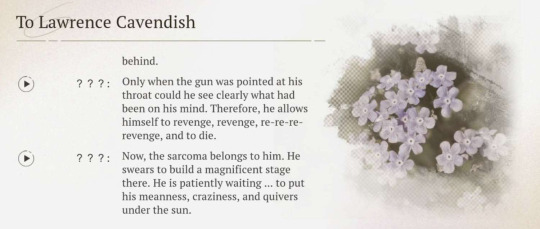
The "stage" is shown when he makes people explode from inside out, a lot of people who recognized him as Forget Me Not, the mixologist. This is when we finally see his true intentions and the main difference between him and Druvis III, all in their respective reactions to the journalists.
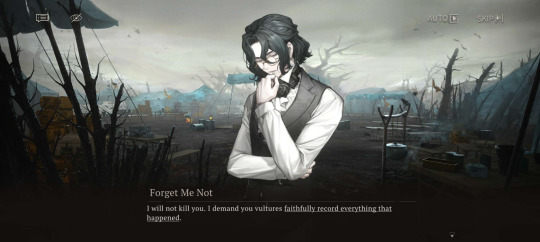
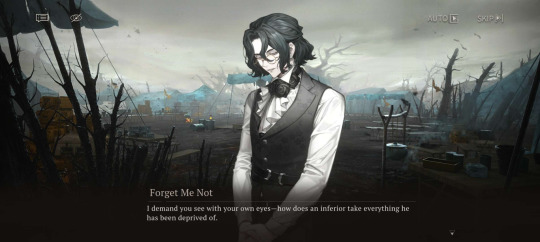
She's terrified, thinking about the day of her family's funeral. On the other hand, he's ordering them to watch and record as he "takes everything he has been deprived of".
This is why the thing that breaks Forget Me Not is hearing that Druvis III does not care about the man who started the fire, that it's not important anymore. He believed them to be on the same page, that she would love to torture the single person responsible for all of her grief. The guy is projecting heavily onto Druvis III.

In the end, I don't know if Forget Me Not resents his father, his family name, if he had some sort of business to inherit and a "future" that was taken from him, or if they actually might've been a happy family.
What I do know is that Forget Me Not's desire for revenge was absolutely amplified and fueled by Manus Vindictae's own agenda. And that's why he works perfectly as both a victim of their MO and a willing member within their ranks.
He clings so hard to the past because there is no future worth fighting for, because everything would be much better if it was rebuilt from scratch with only those that won't oppose him and repeat history. He clings so hard that his new name and identity are, in the end, a plea for the world not to forget who he used to be and, at worst, an order because he sure as hell hasn't forgotten all the things others have done or said Back when Lawrence Cavendish Jr was around. Once his family outlived their usefulness or relevance within society.
TLDR: THIS is the cold-blooded, numb murderer who is actually very sad, empty and broken deep inside that some people wanted Pavia to be. Like, he's even sopping wet and sad and asking Vertin to kill him next time they meet.
Which leads us to my next point!
On the subject of Forget Me Not's self-destructive and suicidal mindset.
We've talked about Forget Me Not's views and relationship with the Cavendish - but what exactly is the end goal? He feels entitled to a better life, one he was supposed to have, and then what?
The "???" narrator mentions a woman who made a promise to Forget Me Not, as well as leaving a "sarcoma" behind which he then adapted and turned into his own. This woman is implied to be Arcana, as we see her talk to Vertin about being able to see the truth, to not be blinded - there's an emphasis in the way she recruits people by opening their eyes to reality. The sarcoma is the city (apparently "Windy City" is used to refer to Chicago, I had to google that but hey, that's pretty neat!). It's the world he lives in and that wants him gone. She focused Forget Me Not's grief towards it because in doing so, it would help Manus Vindictae's ideals of a world exclusively for pureblooded arcanists.
And even so, he remained suicidal. There was at least one more attempt at taking his own life, and that's when he saw "what had been on his mind". Whatever that might've been, no doubt influenced by Arcana and his situation, is what pushed Forget Me Not to "allow himself to revenge, revenge, re-re-re-revenge, and to die".
Ultimately, Forget Me Not's goal is to die at the end of it all - even after he gets his revenge, earns the life he wanted, takes back everything that was meant for him. This is why, after he's fully defeated, his last words to Vertin are to show no mercy next time they meet. To kill him.
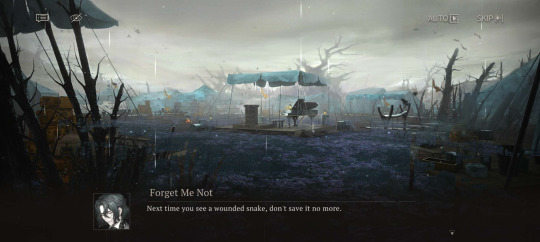

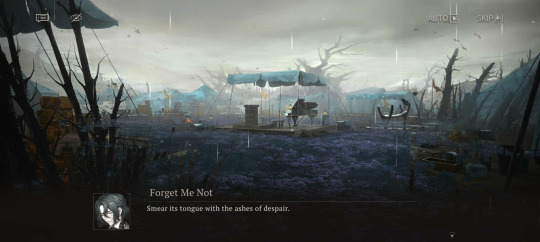
This is not only a long and convoluted plan of revenge, it's Forget Me Not willingly marching into his own demise. And just like before, he's not strong enough to pull the trigger himself. Now that he has no solid argument to justify his anger - all because Druvis III has shown him that people can, in fact, move on - his only option is to have someone else end his life. He's shown tired, and the phrase "Don't save it no more" might indicate that even if there was someone who could repeat what Arcana did to him - give him a sense of purpose and a target for his grief - he simply doesn't have the energy for that.
Forget Me Not's self-destructive tendencies can also be seen in other ways. His job at The Walden is to cater to all the people who shunned him - he welcomes everyone and anyone for the sake of creating a network of secrets, he attends fancy parties and events full of those who call him a drug dealer, Satan's spawn and so much more. And he pretends to be someone else entirely while wishing for others to remember him. He willingly surrounds himself with all the things that hurt him.
His arcanum being related to alcohol is rather poetic to me - since Forget Me Not is said to have spiraled into decadence and into this extreme mindset, it makes sense that his main skill is related to being intoxicated and to drown into something that is largely hated but at the same time, desired and coveted. The Prohibition Era does have a very similar mentality to religion, namely western ideologies - you're meant to openly reject and loathe something, but the constant repression causes you to yearn for it instead. And at some point, this repression can become an addiction in itself, leading some to indulge in it. This loops back to Forget Me Not's association with the snake in the Garden of Eden.
It makes sense to me that he indulges in something so painful, while cohercing others into indulging in forbidden alcohol. That he later uses this very same arcane skill to kill all those people who, in his eyes, represent everything he loathes about the current state of the world. It's like a sarcoma that he now leaves behind, that kills from inside out.
And this is the last time I'll bring up Druvis III in a Forget Me Not post, but notice their choice of flower/plant? She has a mistletoe bouquet - a parasitic and toxic plant which represents positive things such as fertility, life and protection in many different cultures. Forget Me Not has black roses, roses being immediately recognized as one of the most beautiful flowers but, in this context, symbolizing things such as death and rebirth, remembrance, mourning. Their duality, contrast and the "two-faced" aspect is prominent there. And not to get very deep about character design, but Druvis III holds the bouquet very carefully and carries it around with her willingly, whereas the black roses that Forget Me Not wears wrap around his neck not unlike a noose.
To really drive home how Forget Me Not sees himself, here's the description they gave him for his boss fight.
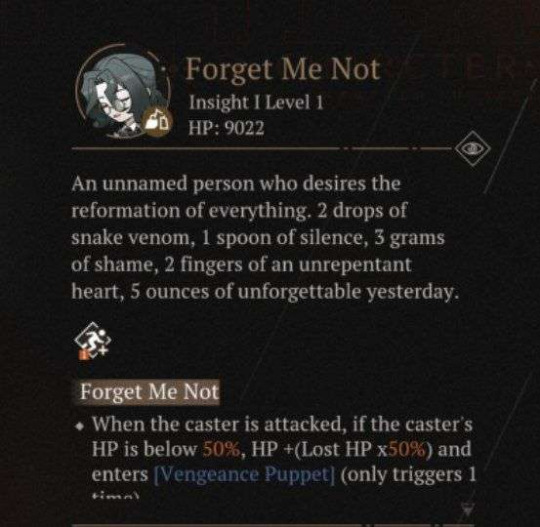
They boil down his character perfectly, to all the little traits that make up his whole emotional baggage.
And to also put more emphasis on how Forget Me Not truly doesn't expect to live and "win" at the end of this whole revenge trip, here's his ultimate - "Heavengazing from Hell". He's fully aware that he's going to be destroyed by his own actions and that the only thing left for him will be to look up at heaven from hell. That all the good things will forever be out of his reach.
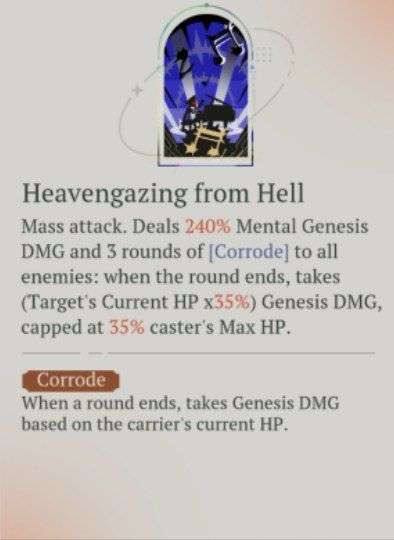
Now, onto proper headcanon territory, since I'm running out of media to analyze!
On the subject of Forget Me Not's scales.
As established before, Forget Me Not is associated with snakes - one of the segments from the Big Mouth Bulletin comments on this. "[...] he had scales under those long sleeves, one next to another embedded in his flesh."
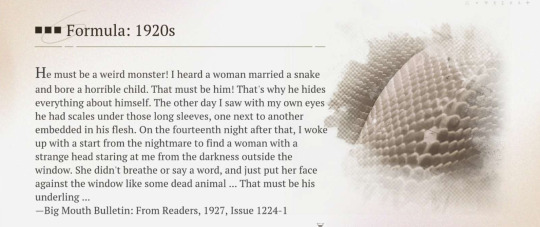
And this can actually be seen on his in-game sprite! It's very faint, but there's absolutely some sort of texture peeking out from under his collar and sleeves that resemble scales. They can also be seen on the trailer animations. The only time these scales don't appear or peek out from his clothes are in The Walden illustration, with the other members of Manus Vindictae, but that can easily be explained as him covering up properly and the angle he's drawn in.
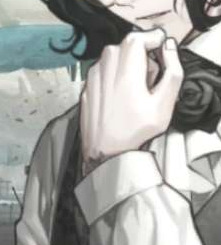

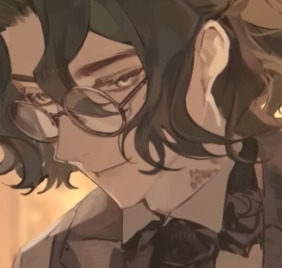

Originally I thought that they could be burn scars, as it would mean a stronger connection between him and Druvis III. But upon closer inspection, they don't look like burn scars at all.
I like to headcanon that it's a side-effect from his own arcanum, similar to how Rabies is implied to look like a scarecrow because of his involvement treating rabies. Being something "self-inflicted" - in the sense of him having the choice to stop and heal, but refuses to - also lines up with Forget Me Not's suicidal tendencies, the whole sarcoma metaphor and the fact that by carrying on like this, he's doing nothing but destroy himself and add to his suffering.
As for how far the scales have extended, I don't have a set favorite idea! Part of me really would love it if the scales coiled around his body like actual snakes, but also the idea of him having different patches of scales scattered throughout (again, like a sarcoma) and the third secret option of him being MOSTLY covered in them to the point where it becomes grotesque, something that he can't even look at.
They're not just a tattoo or pattern embedded onto his skin either - they're actual scales, cold and rough to the touch. The areas affected by this have grown numb, making it hard for Forget Me Not to feel any warmth or pressure applied onto them. This adds to that otherworldly and sinister vibe he's got going on, even if the lack of proper tactile sense irritates him. It's extremely uncomfortable if they're brushed or rubbed in the wrong direction, however!
Sometimes, Forget Me Not might pick at the scales, as if deciding whether he loves or hates them. In particularly bad days, he picks them out. I like the idea that, once picked, the scales grow faster and stronger, as well as in broader areas, making it a perpetual loop of picking them off from his skin.
Overall, it would be extremely easy to conceal them - he only needs a shirt with a higher collar and gloves or some make-up, but I like to think that Forget Me Not loves the idea of someone catching a glimpse of them, a reminder that he's dangerous and so much more than meets the eye.
As much as he he's been affected by the stigma against arcanists, he now thrives in their hatred for him and his existence - sneaking into places he knows he's not welcome is addictive, especially knowing everyone tolerates him because he's their only access to alcohol. The way everyone will turn around and talk shit about him once they're out of The Walden is fun, because it reinforces his views on why this current era deserves to be rebuilt from the ground up.
Forget Me Not has extremely poor eyesight.
I know the glasses look thin and pretty standard, but I just like to think that Forget Me Not can't see shit without them.
He has this habit of taking them off to "clean" them whenever he's talking with those he loathes - mostly humans - just so he doesn't have to look at them directly. Sometimes, he might just close his eyes and dissociate, pretending to pay attention if the situation calls for it. Yes, he's petty and hateful enough to feel physically sick when talking to people he hates.
If you pay enough attention, it becomes clear that eye contact becomes scarce, as if just looking at them will send him into a fit of rage (but he conceals it extremely well when needed).
Forget Me Not's poor eyesight is not a secret, and he often likes to make patrons nervous by making their drinks without his glasses - of course, he knows his way around drinks and potions, there's no chance of him messing up, he could do this with his eyes closed. But seeing customers squirm is such a delight. Because now, they must choose between making a scene in HIS territory or risk being poisoned with a poorly-made drink.
I like to think that he also just has a very fine ear, since he does play instruments (all of his attacks being related to music and him using a piano as his wand during the boss fight). So really, Forget Me Not couldn't care less about his eyesight.
Forget Me Not enjoys floral arrangement.
This is just based on his association with the actual forget me not flower. I think he enjoys creating bouquets or putting up vases full of flowers around his home, even if all of them may end up creating a very gloomy and decadent atmospere - they're perfect for funerals, and he simply may be preparing for his own.
And he leaves them out on display long after they've wilted. "They're more beautiful this way", he'd say.
It's not rare to find Forget Me Not on rainy afternoons with a pair of scissors on hand, absentmindedly cutting every leaf and petal off from all these roses, as if he had a personal vendetta against their colorful hues. Sometimes, he just twirls the stem around, pressing hard on the thorns to feel anything while he looks out the window. He's so very fucking dramatic and volatile.
Basically, I like to picture Forget Me Not as the type of person who has dedicated so much time into something as empty as revenge, that he absolutely has no idea what to do outside of that.
Everything he does is just a way to pass the time until he can go back to dedicate every waking second of his life into his and Manus Vindictae's plans, every "little pleasure" is just a façade, he doesn't get any real enjoyment from anything. Sometime he worries that revenge won't help him climb out of this apathetic life he's built for himself, but he can't afford to dwell too much on that possibility. Everything that he does is muscle memory, he's forcing himself to try and do it, because otherwise he could simply sit still in an empty room for hours on end, with the lights turned off, waiting and waiting - all alone with his thoughts.
#reverse 1999#reverse: 1999#r1999#r1999 headcanons#reverse 1999 forget me not#forget me not#playable forget me not WHEN bluepoch i NEED him#i like forget me not when hes like. deranged#when hes one hair away from hurting others or hurting himself because hes. in the most horrible mindset ever#like hes just looking for an excuse to blow up or blow up others (hehehehehe....get it....)#like sure hes so cool with the walden and his network of information and secrets#but hes still a cowardly snake who hides and needs to be revealed. bc he cant reveal himself willingly and openly on his own#its the loss of humanity again but whereas pavia rejects it. FMN just lives within it. he just masks SO well#'but you cant simp for any manus vindictae character! theyre explicitly racists!' and re1999 is a game that CHOSE to replace#actual racial issues in history with their magic ppl vs normal ppl plot line with many many parallels to struggles poc like me lived throug#and then chose to be like 'hey theyre actually physically different and its xenophobia on a whole different species hahaaa bye'#so like. fuckin chew on that first before coming for me. if we're already suspending our belief for the sake of playing:dont cherry pick#tackle the WHOLE thing the game chose to portray. not just a single group within the whole game#sorry if that was heated but lmfao i saw ppl already trying to dictate who ppl can and cannot simp for on twitter#as if this wasnt another fictional anime gacha game at the end of the day
99 notes
·
View notes
Text
Uncle Gom helping Squirrel Village prepare for the Chuseok
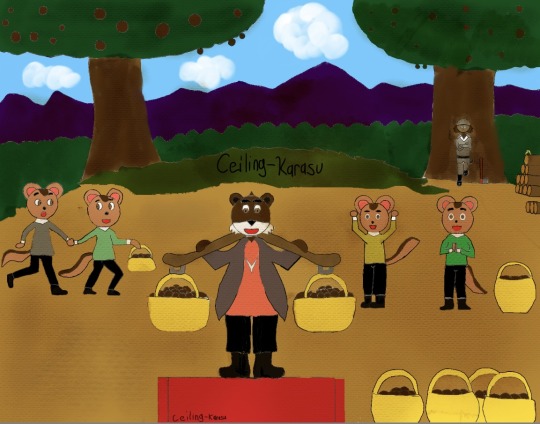
#tradition in my family dictates that I must draw something cutesy for birthdays#so I was unable to spend 2-3 months on this like I did with the Jollin picture#still episode one looking squirrels are fun to draw#squirrel and hedgehog#hedgehog clothing is nice and simple as well#uncle gom#sah#SaH#still exploring the textures and it isn't going the best but I think this looks ok#it is a shame there is not a lot of fanart of uncle gom from what I can see#I just like drawing an axe next to a hedgehog for some reason#Chuseok#Halloween sketches next week and then another thing I thought up#Also something else with Uncle Gom for my dad's birthday#I know the Chuseok was in September this year but still
26 notes
·
View notes
Text
my hot fandom take is that discouraging authentic interaction with fanworks through arbitrary "rules" and increasingly limited and prescriptive scripts of "acceptable" interactions damages fandom as a community perhaps just as much as passive, entitled consumers who demand free labor from fan creators without offering interaction in return
#i just don't know what creators expect when they throw a fit if another fan acts in any way other than the two prescribed emotions they're#'allowed' to have#this is spurred on by fic deletion discourse ftr but it's not limited to it#you're allowed to delete your fics. of course you are. it's your fic#but the fans of your fic are also allowed to be visibly and publicly upset#implying they shouldn't be is saying you don't think people should forge personal connections with your art#which is of course antithetical to art#both actions are allowed AND understandable. you as a creator don't have the right to dictate how people should feel about your work#the only thing that accomplishes is pushing people away. discouraging them from engaging authentically#this also extends to stuff like creating arbitrary etiquette rules around concrit or 'concrit'#yeah it absolutely sucks to get unsolicited crit in your comments. of course it does. you worked hard on that#but saying people should never criticize a fic means that well meaning fans will avoid engaging authentically with any fic at all#because they internalize that speaking about a fic beyond 'i love this!' is somehow rude to an author#and this is NOT a hypothetical. i see this exact behavior all the time. they're too scared of offending to be genuine or contribute to art#art is a discussion. if you refuse to let other people participate in that discussion then you are just as much at fault for the destructio#of the community as passive consumers are. all because you don't want your feelings hurt#unfortunately you DO have to accept that someone may be rude to you or behave inappropriately about your art#in order to get authentic feedback from other not-rude people. there's no getting around it#but people seem to have chosen isolation over community yet again. because we're all scared of criticism and judgment#alas!
16 notes
·
View notes
Text
thinking about millie & john’s journal. thinking about. john doesn’t know how to raise her. once upon a time he used to say he wanted daughters, but he has one, and he doesn’t know what to do with her. sometimes he looks at dean in the right light and sees mary, and sam has always had her eyes. but millie’s eyes are john’s eyes and if the tilt of her chin is her mother’s, then he never knew her well enough to remember that detail. and he let her into this life too fast, he thinks sometimes, because sam had to be old enough so he forgot that millie wasn’t. she was a child, and then she was a young woman, and if there was an in-between, he doesn’t recall it clearly enough, it can’t have lasted long.
so. millie and john’s journal. how exactly do you bond with this girl who is your but not your wife’s. how do you make sure she understands this war, because she isn’t like your boys and she didn’t lose what they did. and maybe most importantly, how do you make sure she knows how to spell right, because you gave up hitching her from school to school and told yourself she had two older brothers who’d done enough to fill in whatever blanks she needed.
(and maybe just maybe you were only keeping sam and dean in school cause you were still delusional enough to think this would all end one day. that isn’t happening.)
see what i think happens is that john lets her write in it. not whatever she wants, mind you. the words are all still his. but it’s in her handwriting. he lives and learns and hunts, and she chronicles, quite diligently, whenever he can’t, either cause he’s too tired to write or he’s injured his hands or because she’s bloody and shivering off the adrenaline comedown and he’s got to put something in her hands to do before she starts lashing out like a scared animal.
the start of john’s journal is all his own, but somewhere in the middle, she starts popping in. they’ve got way different penmanship, he prints it neat and quick like he’s been doing for years, she gets it down jagged and full of crossed out words, misplaced punctuation. gets better as the years go on, but it’s clearly two different people keeping notes.
(she’s better in shorthand. she knows it. sam and dean don’t. never really came up for them. if john leaves them coordinates, he leaves her a scrawl only she even recognizes is meant to be a word.)
by the end of the journal, it’s just her left writing in it. even before john leaves, before he dies, she’s the one doing upkeep on his life’s work. which is the source of the worst of her and dean’s arguments. her brothers treat the journal like a religious text. millie’s convinced it needs to be a living document, corrected and added to, and besides, ‘i have a right to do so, Dean, dad let me write in it!’
i think she likes having those secrets. this little thing that is just for her and john. because sam and dean get to have secrets, they get to have parts of their father all to themselves. she’s special, to have this shared with her, entrusted to her. (it means she knows him best. she must. she was the one he let know everything in the journal, in his head, long before he left it for the boys. she knew him best. he wanted her to know him best. wonder how many times she repeats that to herself after he’s dead and all that’s left to do is debate his memory.)
#round of applause for millie who only knows how to sew the leftovers of dead people into her selfhood#i just know the blowouts she and dean have when he catches her crossing out incorrect parts of john’s earlier entries is explosive#there’s an undercurrent of anger and jealousy and fear that their familial footing isnt what they thought it was when they fight about this#john does that to his kids. rip.#another thing is that john dictating to her wasn’t a one-to-one process it was her picking out bits. and omitting what he told her to omit.#happily omitting it from the book. and still having it locked up in her own head.#i don’t think millie was surprised john asked dean to kill sam. i don’t think she was at all.#spn oc
11 notes
·
View notes
Text
I get hating certain political systems and trying to abolish totalitarian regimes but at the same time many of them are so interwoven with our history and society they have become tropes and when I consume media with a setting where the monarchy is absolute and revered then I am playing my part and sucking that princeling off
#litchi.txt#there are games that address this kinda stuff! and thats good! its good that there are games talking about how this is bad!#but at the same time when I go into a game knowing I will be the prince's sword and shield I dont expect the game to be anti-monarchy#despite having pretty strong opinions on many a thing I tend to put most of them away the moment I engage with media#imperialism bad. monarchy bad. doesnt mean I cant enjoy roleplaying in a game where I help these systems#because guess what its fictional and not everything needs to be a strong statement about politics#sometimes we just... wanna vibe with a setting#I am so very thoroughly exhausted from the politics in this country and where things are going I just kinda need that no brainer gameplay#even if it means working as the secret police for an emperor#even if it means replacing one dictator with another#because its still a game#a lot of people talk about imperialism-monarchy-colonialism with these things because they are a big issue even today#and they are important to talk about!! in real world!!#but I rarely see people be this upset about like religion etc which like. thats also a massive problem.#idk Im just tired of trying to look at fanart of all my fantasy medieval games and people being upset that the games#are not super anti-monarchy despite the marketing being literally 'you are the emperor's bestie. you help him out and go on a quest.'#'your quest is to manipulate local government to support the emperor and do his bidding'#like idk how That is supposed to be a game that addresses it properly#and maybe it does but ig since the MC doesnt look at the player and go REMEMBER KIDS! THIS IS EVIL AND BAD AND WHY MONARCHY SUCKS#it doesnt count??? I guess???
29 notes
·
View notes
Text
Wearing my Big Time Rush Forever Tour 2022 tshirt while I Pokemon Go to the polls
#please kamala harris. pls americans. restore the little faith ive had that we could defeat trumpism once and for all#he never shouldve run again. straight up after jan 6th it shouldve been illegal#what a coincidence that it's guy fawkes day and we're at risk of reelecting a man who attempted a violent insurrection#tales from diana#i remember when we went to the forever tour in gilford nh it was 6/25#i don't remember how recently it was from that point exactly but it was right after roe was overturned#on the highway i saw a large sign that said 'white and proud' and i just recoiled#what a loser you have to be#yeah politics was weighing on me heavily that day even tho it wasn't election season yet#the midterms were still months away. and those are important but they do not carry the same dread#i love you guys. whatever happens i love everyone who is trying to prevent this would-be dictator from another term#i hope this ends in celebration. but no matter what#thank u to everyone who has commiserated w me in my anxiety about this man. thank u to everyone who has fought to resist him and his allies#i really do dread the potential worse outcome so much that my hope feels extinguished#but it isn't. we still have this. no matter what happens we have each other
10 notes
·
View notes
Text
I am once more posting about how character refusing medical treatment for no raisin is possibly my most beloathed trope
There are so many very legitimate reasons a fictional character might not get treatment!
Allergies
Negative interaction with a medication character is already on
Negative reaction to the medication in general
Character is nonhuman/alien/mutant/etc and standard medical treatment won't work
Not registering injury due to shock/nerve damage
Not registering injury due to pre-existing chronic condition that made things suddenly, unexpectedly much worse
Not registering severity of injury because internal bleeding can (and often does!) look a lot like bad bruising
Hospital is haunted
Injury greatly exceeds current medical resources (ie it's a spinal fracture and all they have is a My Little Pony first aid kit)
Character believes that death is imminent
Character has something illegal/taboo/valuable attached to their body (from illegal body-mods in a sci-fi universe to curse in a fantasy universe)
C'mon, guys, I get it! I also love when characters get the ever-loving blue-eyed shit beat out of them! Just, give 'em some actual reason to suffer. A basic pretext. Please.
#this post brought to you by yet another 'obiwan torpedos the chain of command by avoiding medical treatment for no reason' fic#it should be the other way around tbh#he should be hiding out in medbay to avoid the paperwork a little longer and ends up with a stone-faced aide#taking his dictation from the hospital bed#tccc at home
310 notes
·
View notes
Text
sometimes people who struggle like to make jokes or find positives about their condition that causes them to struggle so they can escape the constant negative and struggle. sometimes autistic people will say things like "the 'tism" or use the "autism creature" or say their autism helped them have a *positive trait* to feel better about their struggles. because living your life only focusing on the struggles and negatives is depressing and makes it hard to want to live, even if those struggle take up 100% of your life and you can't actually escape them. sometimes any little seemingly positive thing can help a lot.
but there's so many other autistic people that hate when we do that and call it "reducing autism to a cute trendy thing" and say it takes away from *their* struggles and is bad and shouldn't be used. maybe *you* want to only focus on your struggles, but some people can't live in constant negative and need some positive or to find ways to make their condition more positive so they can feel better about living with their struggles. life is hard. I take anything I can get.
I cant get jobs. I can't make and keep friends. I can't get help and support for doing "normal" things so sometimes I go weeks without being able to shower and without eating more than a bowl of cereal a day. most times can't even do things I like. struggle to communicate. have meltdowns. i'll never be able to live independently. I struggle a lot. but instead of sitting here always depressed and having no motivation to live, i'd rather try to joke about "my 'tism is acting up again" when i'm struggling (just an example. don't think I ever actually used the 'tism thing but i saw others use it) or say "i'm just being a creature" when I need to stay in my dark room because everything is too much and I personally find it cute to be a little creature meant in a positive way. i'm not actually downplaying mine or anyone else's struggles. I still acknowledge them and that silly jokes dont make them go away. i'm not trying to be trendy. i'm not doing any of the things people say we do by making silly little jokes. i'm using the silly little jokes to convince myself life can be a little more than pointless, painful garbage all the time.
(continue in tags)
#dont know why continuing in tags but here is more#sometimes we need to ask “why” and not just get mad about how we feel personally. because other people feel differently#yes im guilty of only thinking my feelings and situation and how it relates too and forgetting other peoples. i also need to learn#and everyone's feelings should be valid. just because something might “hurt” you it might be important for someone else#everyones feelings are valid. but we cant protect everyones feeling. so idk the solution#but stopping someone from having a small positive among a sea of nevgative seems a little mean to me#youre not being empathetic to their side. and i can turn it around and be not empathetic to your side and say stop being upset#and get over it and let people have fun. but i wont. i hear you. but at the same time maybe hear us too.#not everyone wants to live only negatively. youre allowed to but dont expect others to.#and yes i GET IT these things can make the allistics and neurotypicals be even worse towards us. but what do we do?#throw out any positivity we can find and grovel in our struggles because the allistics wont take us seriously?#DO THEY TAKE US SERIOUSLY WITHOUT THOSE SILLY TRENDY THINGS? NO! THEY NEVER HAVE#like i said i dont know the solution and everything still be used against us by those people anyway so might as well have fun?#if we focus on struggles they baby us and dont let us do things and block us from living life#if we focus on positive they dismiss our struggles and try to make us do what we cant and dont help us#we cant win! so its not “the 'tism” or whatever other things people made up that cause them to act this way#they already act that way and wont stop unless we figure out how to teach them! but i dont know how! im just a useless little creature#this is probably controversial and someone will get because i dont agree with their perspective despite respecting it#someome will comment to lecture me even though i get it. i do. but two things can exist at the same time!! idk what to tell you!#autistic#autism#actually autistic#lee rambles#words are hard so dont know if i worded it well or not. probably not#also why take away fun things because another group used it for bad? make them stop the bad not stop the good!#i also might be missing more context. i think is about tiktok using these for bad. tiktok is just bad in general and i refuse to use it#why tiktok dictate and ruin our lives now in general? tiktok is really bad 😂 but that another conversation#no one yell at me and say i dismiss struggles of struggling autistics. maybe you dismiss me needing negative thing to have positive?#not in mood for negative response. will probably cry fhhddhsjdjdjkd#today is real struggle day but if i be little creature i feel better
17 notes
·
View notes
Note
i don’t know too much about motogp in depth enough to send specific asks but please know that i am ALWAYS seated for your class! i really enjoy reading your takes + essays
man this is so so kind, I am always a little lost for stuff to say when I just get like. people being lovely in my inbox - trust I do read and appreciate it, just get very hung up on the responding bit
anyway, this ask I think was sent the day after this long post about the similarities between casey and valentino was dropped, which has kinda been where this blog has been living for the past month,, so. in my head. I'm choosing to believe this was specifically about that essay. and I just wanted to quickly toss in one more thing - y'know the bit about sachsenring 2010, right, where valentino shows up way way ahead of schedule from the whole broken leg situation and also jorge and casey have kinda been engaging in a teensy bit of trash talk in his absence and the vibes are. off


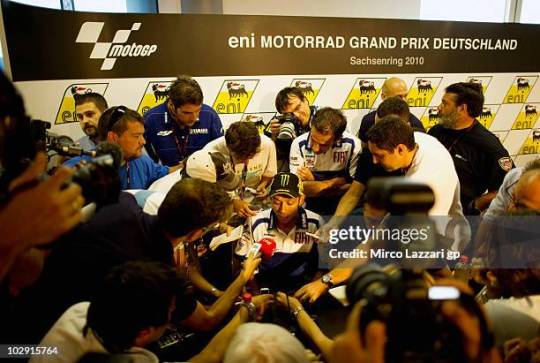
so then casey and valentino had a very tight very cool battle for the last podium position, 10/10 would recommend, low key one of the top 3-4 races that season. valentino's fighting his demons (leg recently broken), casey's fighting his demons (bike sucks), you can tell how badly they want to beat each other... and casey manages to take the shine off valentino's return by snatching the final podium place in what you just like. know. was extremely satisfying to him. you just know it!! he won't say it because he's so hung up on the 'ooh I don't get obsessed with my rivals' shtick (lol) but it's very obvious how badly he wants to beat valentino! and then after the race when they're talking to the press, casey's like,, valentino's comeback is really not that serious, the leg's fine he's just lost a bit of muscle mass,, idk why everyone's making such a big deal,, and then valentino starts throwing jibes in his direction about how CASEY would have complained if VALENTINO had ridden like CASEY had, but of course VALENTINO would never do such a thing,,, and in the timeline of the rivalry this is very much when we start descending to kindergarten level
anyway given the tone of the on-track battle and how much shit they talk about each other in the immediate aftermath, you simply have to be deeply endeared by how they behave post-race when they're actually on the bike. classic hand grab and thumbs up situation, valentino recognising casey's performance in all its viciousness:
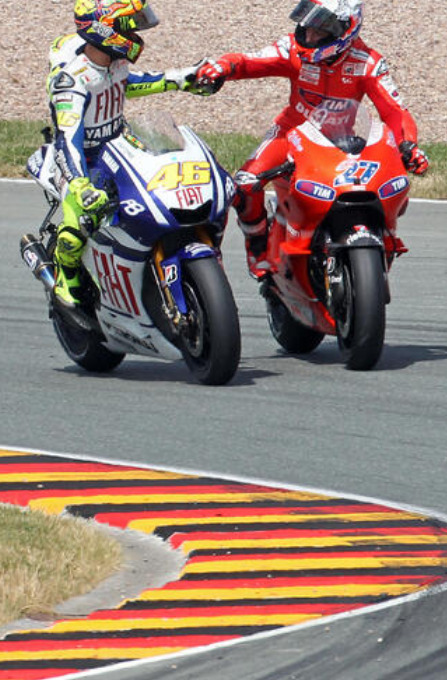
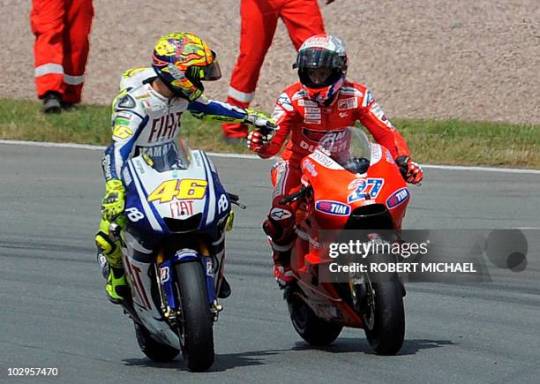
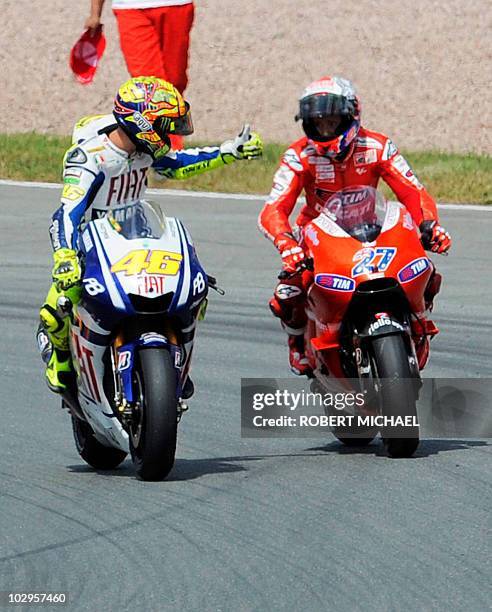
but then what really prompted this whole thing was. this photo..? where valentino has managed to straight up reach into casey's helmet:
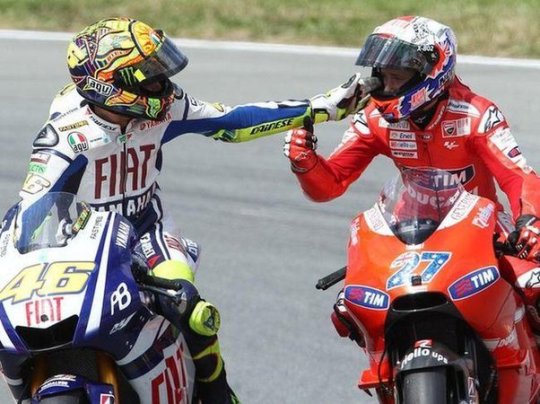
like is he trying to poke casey's eyes out what's happening here. looks like he's doing finger guns in his face. why's he getting so close. isn't this a lovely quirky little photo... casey's doing an insincere thumbs up at him and valentino's attempting to stroke his cheek. fascinating. they're about to say some out of pocket shit about each other to the press btw
#common motogp etiquette dictates you don't do post race handholding with those you are engaged in an active feud with#but let the record reflect that as late as 2011 these two have been recorded engaging in post-race handholding...#gonna try this new thing where i actually reply to people being nice in my inbox rather than just. putting those off. i do treasure themmm#//#brr brr#batsplat responds#heretic tag#the Problem with sachsenring 2010 is that it very much feels like the start of something#like valentino is right in that it does reflect a bit of an escalation from casey's side#and you'd think that would lead somewhere but obviously because valentino nukes his own competitiveness it really doesn't#so casey's line of 'oho he shouldn't have made an enemy out of me!!' obviously doesn't stand up to scrutiny. but maybe it would have!!#The People Would Have Liked To See It Play Out#it also means casey's on-track narrative arc feels a teensy bit unfulfilled#because he does low key get to win the 2011 title exactly as he did 2007. like he doesn't really have to integrate the lessons he learned#off-track? yeah absolutely 10/10. jerez 2011 is like a graduation ceremony in that regard. but we needed another valentino fight.....
10 notes
·
View notes
Text
one of my favorite niche lore tidbits in genshin relating to childe has to do with the fact that like. everyone talks about his death flags this his death flags that but no one talks about how his c6 is the biggest fucking insta death flag ever just not for. Him. but whatever poor entity hoyo ever openly labels as an "angel" matching the title in the future

like talk about a prefunneled L
#like its gonna be all oh cool new entity slash character slash new title to a known figure and tjen its like#uhhhhhhh so coincidentally this guy from 1.1 has been dictated to be explicitly out for your ass personally whats up with that huh#anyway. 'poor entity' im lying i bet its ptplly gonna be like the primordial one which means ill be cheering the entire time#also how its called 'annihilation'.... like not execution not final blow not killing strike.... but annihilation. Like thats so hot#fuck them up ajax whoever they are 😊😊🥰#also yes. we have another english translation oopsie moment#childeposting#genshin#rambles
27 notes
·
View notes
Text
the cameron hate is crazy to me bc if wilson was a woman hed literally be like cameron
#mine#i need to pick her brain apart shes so interesting to me....there was one blog on here that had a bunch of cameron meta and i never rb'ed#it bc it had like ZERO notes + was untagged + was from like 2021 but it was so good. op got it perfectly#i think op deactivated tho so erm. the world shall never understand her i guess#the whole dictator thing too like...wilson would 100% make his ghost house for two months routine if that happened w them#my hot take is that i think wilson and cameron r more similar to e/o than house and amber tbh#but thats another post
27 notes
·
View notes
Text
Ngl, studying history, especially contemporary history often about how powerful countries played a roll in sabotaging a developing nation, means a few times a day you see a post posted by someone who obviously doesn’t study history but is using a historical event to further a political point (that I usually agree with but it is completely out of context and usually super disrespectful) and it will literally have thousands of likes and you just have to learn to sigh and move on.
#this applies to all social media but this post is specifically from a post I just saw#when I say it took twenty horrific historical events#being super vague about the event to once again further a point#literally there were a few that I was like okay I get the point but I don’t know what specific event this could even be referring to#and a lot of these posts ultimately make points I agree with#that you can have many historical examples to further back up their point#but then it’s taken completely out of context#erasing the suffering and deaths of thousands of people in the events they’re describing#and it’s just#using genocide dictators and devastating proxy wars or war in general started under false pretense#that resulted in the unjust injury or death of thousands possibly millions#should not be casually mentioned once in a sentence to prove a point#it’s disgustingly disrespectful and usually distorts what the historical event was by describing it in a simple sentence#the post that inspired this literally listed like 30 countries which each having absolutely devastating history perpetuated by the us#but op says nothing more than us as wronged this country this country that country ect#to go on to defend another point (that I agree with)!!!!!#I cannot stress how misleading and disrespectful it is to bring up a historical event#especially a catastrophic event#mentjon it once and then move on to make a point#it undermines your point because you see it as nothing more than a summary#it makes me want to scream#rae’s rambles
4 notes
·
View notes